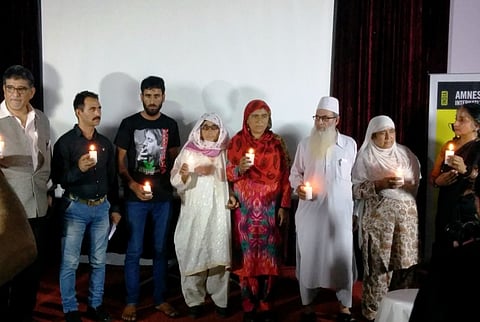

On Saturday, Amnesty International India organized an event called ‘Broken Families’ for Kashmiri people whose family members were killed allegedly by the armed forces. However, the event was disrupted several times by various groups of people.
The beginning of the event itself saw flared tempers when Tara Rao, Amnesty International Program Head, mentioned that thousands of Kashmiri Pandits had been driven out of their conflicted homeland. Representatives from the Kashmiri Pandit fraternity in the audience answered with calls of “five lakh” and that Ms Rao should get her facts right.
When order was restored, and video testimonies of the families were played, the gathering was silent but for the sobs of Raja Begum (mother of Manzoor Ahmad Mir who was subjected to an alleged enforced disappearance in 2003) and Mymoona Begum (mother of Altaf Ahmad Shah who was arrested from his house in 2002, and allegedly tortured and succumbed to his injuries).
As Ali Mohammad Shah, Altaf’s father took the stage to narrate his son’s story, many in the audience were left misty-eyed. “Ab mewa khaana toh duur ki baat hai, saaya bhi nahi naseeb hoga maa baap ko,” he said, weeping. (Not only will my son never ask for sweets again, but even witnessing his shadow is not in his parents’ fate).
The panel discussion that followed, however, broke the dam on the barely contained tension in the room again. Panellists included journalist Seema Mustafa, president of Bengaluru Kashmiri Pandits Association RK Mattoo, mother and brother of Shahzad Ahmed Khan (one of the three youths killed in Machil fake encounter in 2010) participated in the discussion, hoping to put across two perspectives.
Seema opened the discussion by saying that in the years that she had covered Kashmir, no Kashmiri, whether Hindu or Muslim, was unaware or apathetic of each other’s suffering. However, when RK Mattoo said that the Indian army was one of the “most disciplined” in the world, slogans both in support of and castigating the armed forces erupted.
A man wearing a t-shirt with “Kashmiri pandit” printed in the back shouted “India is united because of the army!”. From across the room rose another slogan: “Kashmir par vaar kisne kiya?!” (Who attacked Kashmir?).
After some very long, tense minutes, which also saw police personnel called in to control the crowd, calm was restored again. Throughout the tension and furore, the families who had come all the way from Kashmir remained calm.
The final leg of the event was a performance by rapper MC Kash which also ended abruptly. Young people in the audience cheered loudly as he walked into the room and on to the stage. However, when he was asked to end his performance early due to the 8.30 deadline, the angry rapper exited the stage and yelled “This is bullshit!”
Youngsters who enthusiastically sang along and raised their fists in the air when MC Cash performed also gave calls for ‘azaadi’. In a few moments, a crowd gathered around him at the back of the room crying out “Hum kya chahte hain? Azaadi!” and “Chheen ke lenge, azaadi!”.
Tara Rao tried to restore order in the room to close the evening, some of the young Kashmiri men joined the calls while others tried to break the crowd. In the midst of this mayhem, Aisha Begum, Shahzad Ahmad Khan’s mother took to the stage, sat down and said something in Urdu. A young Kashmiri man from the crowd rushed to the stage, took the microphone from her and called for the crowds to settle. “Please, listen to your mother,” he appealed.
“You pressurize a child to a limit. For a while he will take it, but then he will get agitated enough to pick a stone. Now he is so repressed that he isn’t willing to listen. That’s what happened here,” said a Shazia*, a 23-year-old Kashmiri girl, who attended the event and is now a working professional in Bengaluru. “And we’re not even against India. It’s not about India, it’s about people,” she said. “People have been caged in their houses for 30 days! What about those people who earn a daily wage, who earn hand to mouth?” said another girl who wished to remain unnamed.
A college student from Baramulla, Ayaan* said that the slogans said that there were three families here who had lost someone to forced disappearances, fake encounters and the like. “There are so many others like them. There are at least 3,000 unnamed graveyards there because we don’t know who they are or how they died,” he says.
A day after the event, the BJP and ABVP have protested against Amnesty International, alleging that the rights group was promoting “anti-national” sentiments. However, Ayaan has a different perspective to offer. He says that when you grow up hearing about cases such as those of the broken families, you don’t feel proud or safe when you see the army. “We just feel fear,” he says.
Amnesty International, in response to the protest, said that it is not the organisation's policy to take a position in favour of or against demands of self-determination. "However, Amnesty International India considers that the right to freedom of expression under international human rights law protects the right to peacefully advocate political solutions that do not involve incitement to discrimination or violence," it said in a statement.
*Some names have been changed on request